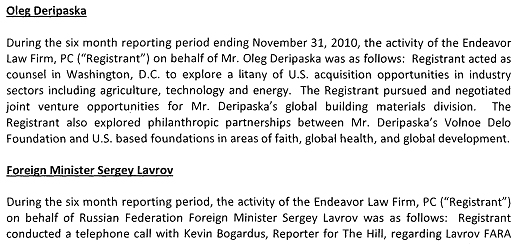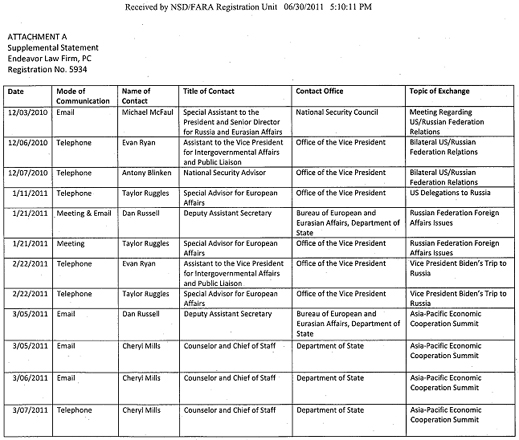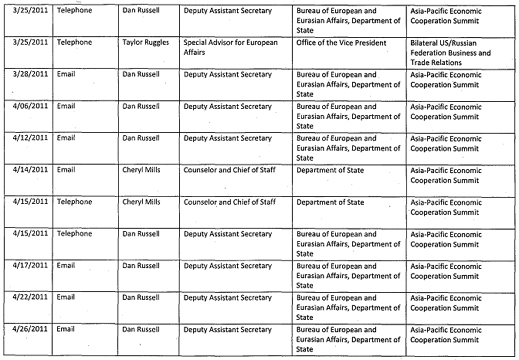
By John Helmer, Moscow
During this week’s Washington, DC, visit by Russian Foreign Minister Sergei Lavrov, a mid-level State Department official appears to be the key to whether Oleg Deripaska’s lobbying campaign to recover his US visa will succeed.
Dan Russell, who served in the US Embassy in Moscow between 2003 and 2008, is now Deputy Assistant Secretary of State for Europe. In a file just released for internet access by the US Department of Justice, Russell has been named by Deripaska’s lobbyists as having been on the receiving end of a spate of telephone-calls and emails – more than any US official has ever received from the Deripaska lobbyists to date; in the public record, that is.
State Department, US Congressional and US business sources corroborate the lobbying effort. But last week they reported that Russell’s subordinate in charge of the Office of Russian Affairs at the State Department, Kyle Scott, had been abruptly removed. According to the sources, Scott’s performance on Russia has been notorious. The reason for his removal – one source calls it a “reassignment” — has not been made public.
According to the latest disclosures from the Justice Department files, here are Deripaska’s American targets:
The file comes from Deripaska’s registered agent in Washington since 2009, the Endeavor Group, owned by Adam Waldman. Waldman employs a second lobbyist for Deripaska – Carolyn Ince Mansfield, a lawyer whose career includes a stint as a defence attorney specializing in what she calls “complex civil and criminal litigation with an emphasis on white collar criminal cases.”
The Endeavor Group’s efforts to camouflage what they do for Deripaska were corrected after they became the focus of US and French press reporting in June and July of 2009. That was soon after Deripaska hired them in May of that year.
Subsequent reporting by Waldman and Mansfield to the US Department of Justice’s Foreign Agents Registration Unit (FARA) confirm that they remain on a $40,000 per month retainer, paid by Deripaska cut-out companies. The FARA filing last September identified the Russian Foreign Minister, Sergei Lavrov, as a principal in the lobbying campaign for Deripaska’s visa.
A well-known Russian business figure personally familiar with both Lavrov and the US visa problems of Russian oligarchs says that over the years it has been standard operating practice for the Foreign Minister to communicate with the US Secretary of State when the Russians are excluded and their entry visas revoked. For the Foreign Minister to communicate directly with a lobbyist in Washington was a “surprise”, the source said.
Subsequent filings by Endeavor Group to the Department of Justice report Lavrov as a “principal” on a par as their client with Deripaska.
For some months Endeavor has told the US Government it has been paid substantially more than the $40,000 monthly fee. For example, in February and March of this year, Deripaska paid $101,302.29. Allowing for the modest cost of telephone calls and emails within the District of Columbia, it appears that in February and March Waldman and Mansfield undertook an extra $21,302 worth of “reimbursable expenses and services” for Deripaska and Lavrov. What they did and what those services were are suggested by the first chart – they were communicating with two men in the Office of Vice President Joe Biden — Evan Ryan and Taylor Ruggles — and with Dan Russell at State.

Ruggles has been identified in Norway as an American intelligence agent, working under diplomatic cover but in charge of sensitive National Security Agency (NSA) intercept and surveillance operations. Ryan has worked for Hillary Clinton and Vice President Joe Biden in political campaign roles, and is one of Biden’s spokesmen. Cheryl Mills, who is recorded as having received three emails and two telephone calls on Deripaska’s business, is a lawyer and chief of Clinton’s personal staff.
Russell’s position in the hierarchy of State Department decision-makers on Russia is relatively invisible. In charge of covering Russia, Ukraine, Moldova, and Belarus, he sits above the director of the Office of Russian Affairs and the US Ambassador to Moscow. But he ranks below Phillip Gordon, Assistant Secretary for Europe; William Burns, Under Secretary; James Steinberg, Deputy Secretary; and Secretary of State Clinton. Russell has twice before served with Burns – as his deputy when Burns was US Ambassador to Moscow in 2005 to 2008, and then as his assistant in 2008-2009, when Burns became Under Secretary. The targeting of Russell by Deripaska’s agents appears to open channels to Burns and to the highest level of US decision-making on Russia.
According to the agents’ filings by Endeavor, pursuing Deripaska’s visa was on the top of their agenda last year. For example in October last, Waldman signed documents claiming his job was:
He also told the Justice Department: “we anticipate gathering information and providing advice and analysis as it relates to the US policy towards the visa status of Oleg Deripaska.”
Deripaska himself provided misleading claims about the cancellation of his US visa in the prospectus for Rusal which was issued at the Hong Kong Stock Exchange in January of 2010, just ahead of Rusal’s first public share sale. According to the Rusal prospectus:
| “In addition, there has been negative coverage in the media recently relating to the rejection by U.S. authorities of Mr. Deripaska’s application for a visa to enter the United States. Some of such coverage includes speculation that the rejection was due to alleged connections to organised crime. There were also media reports alleging that Mr. Deripaska had travelled to the United States twice in the past few months using entry permits arranged by the Federal Bureau of Investigation, with whom he is alleged to have met during his visits. Mr. Deripaska has confirmed to the Company that he had an application for a U.S. visa denied in 1998 pursuant to Section 212(a)(3) of the U.S. Immigration and Nationality Act, which relates to aliens deemed ineligible for U.S. visas based on security, unlawful activity and related reasons, and that this position was reiterated in 1999 and 2000. Mr. Deripaska has repeatedly and consistently challenged these denials as being unwarranted and unsupported. He has also confirmed to the Company that he subsequently visited the United States lawfully a number of times. The most recent visits were in August and October 2009. On these occasions, Mr. Deripaska was permitted to enter the United States pursuant to Section 212(d)(5) of the U.S. Immigration and Nationality Act, whereby neither his movements nor his activities was restricted. Mr. Deripaska has also confirmed to the Company that, to the best of his knowledge, he is not under investigation by any U.S. authority.” |
In fact, Deripaska’s two visits to the US in 2009 were allowed on the basis, not of the lifting of the visa ban, but on the basis of parole – a waiver of the ban for a limited time and purpose. Parole under the US Immigration and Naturalization Act is just as restrictive as the visa ban. But the prospectus fails to disclose that – or the reasons the US security agencies have in their files on Deripaska.
Since then, however, Deripaska came under new investigation by the US authorities for the attempt to attack this correspondent in Moscow in December of 2009. The plan of attack, which employed two gunmen and a driver, was discussed on the telephone and intercepted by a non-Russian intelligence agency, which compiled and circulated a report of what was said. Ruggles’s agency, along with other US intelligence services and the State Department, have copies of the intercepts report and the tipoffs sent to John Helmer.
Not long after the Rusal listing in Hong Kong, when the Rusal attack plan for Helmer and the arrest of the gunmen were still in the news, State authorized Matthias Mitman, a minister-counselor in the US Embassy Moscow, to speak to Rusal about this case and other attempts to suppress press coverage of the company, which Deripaska considered detrimental to his share price.
| Classified details of what Rusal executive Sergei Chestnoy (right) said were reported to Russell at State. Chestnoy worked at the Russian Embassy in Washington, and then at the Foreign Ministry in Moscow, before going to work for Deripaska. |  |
If Deripaska’s lobbyists acknowledged that Deripaska’s visa was their priority in 2010, they haven’t mentioned it this year. In January, Waldman told the Justice Department this is what he was doing for his money:

The next six-month report, due for the period ending May 31, 2011, was filed just before closing time on June 30. Once more, the lobbyists work harder for Deripaska and get paid more. There is a reference to meetings with Russian and US Government officials “regarding political and legal matters”, but there is no mention of the Deripaska visa.
Instead, for Deripaska the lobbyists claim this is what they have been talking to Russell about:
For Minister Lavrov, this is their additional claim:
















Leave a Reply